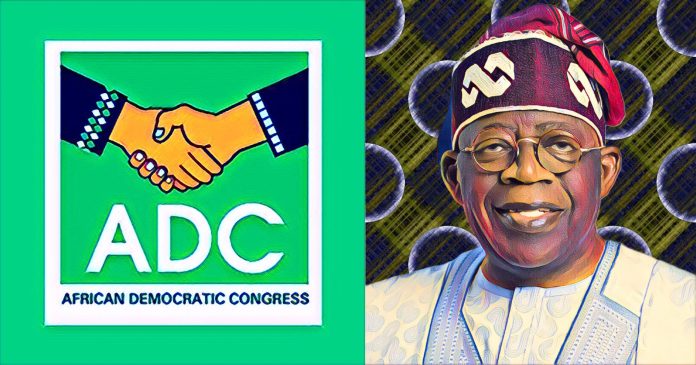Key Points
-
Coalition of opposition leaders adopts ADC platform but faces internal divisions and defections.
-
Key political figures like Atiku, Obi, Amaechi, and El-Rufai are yet to fully align on leadership ambitions.
-
Tinubu’s APC remains dominant with 23 governors and legislative majorities, casting doubts on opposition’s preparedness.
For over a year now, Nigeria’s leading opposition figures have been relentless in their criticism of the Bola Tinubu-led All Progressives Congress, APC, government.
From economic policies they describe as anti-people, to claims of stifling dissent and edging Nigeria towards a one-party state, the opposition has not held back.
But beyond criticisms, these leaders have vowed to join forces, no matter their party differences, to stop Tinubu and the APC in 2027 — a plan they say is a “rescue mission” for Nigerians suffocating under APC’s grip.
At the forefront of this coalition are notable figures: former Vice President and PDP’s 2023 presidential candidate, Alhaji Atiku Abubakar; Labour Party’s Peter Obi; NNPP’s Senator Rabiu Musa Kwankwaso; and African Democratic Congress, ADC, National Chairman, Chief Ralphs Okey Nwosu, among others.
ADC emerges as coalition’s platform
After months of backroom talks and political shuttle diplomacy, the opposition leaders agreed to adopt the ADC as their rallying platform for the 2027 general elections.
On July 2, 2025, in Abuja, the coalition was formally unveiled, with key political figures from APC, PDP, LP, and other parties pledging allegiance.
Among those who signed up were former Senate President David Mark; ex-Rivers State Governor Rotimi Amaechi; former Kaduna State Governor Nasir el-Rufai; former Interior Minister Rauf Aregbesola; and serving lawmakers across the states.
In a major shakeup, ADC’s national officers led by Nwosu stepped aside, paving the way for a new interim leadership headed by Mark (as National Chairman) and Aregbesola (as National Secretary), tasked with the singular mission: to defeat Tinubu at the polls.
The question on many lips now is: Can this coalition recreate the 2015 feat when the APC, a fledgling opposition at the time, unseated the then-ruling PDP?
APC’s 2015 triumph: A history lesson
The journey of the APC to Aso Rock didn’t happen overnight. Talks of forming a mega opposition party started before 2010 but failed to materialise in time for the 2011 elections.
By 2013, determination paid off as ACN, CPC, ANPP, factions of APGA, and DPP merged to form the APC.
With Muhammadu Buhari, who passed on recently, as its presidential candidate, the APC defeated incumbent President Goodluck Jonathan in 2015, ending PDP’s 16-year dominance.
Fast forward to 2027, the APC would have been in power for 12 years. The question remains: Can the new coalition halt the APC’s march to equalling PDP’s 16-year reign by 2031?
Many hurdles on the road to 2027
Despite the noise and grandstanding, the coalition faces daunting challenges. The opposition remains fragmented, with lingering mistrust among its key players.
Unlike in 2013, when opposition leaders abandoned their parties to form APC, many heavyweight politicians are yet to fully commit to the coalition.
Some Senators, including Aminu Tambuwal, Abdul Ningi, Enyinnaya Abaribe, Ireti Kingibe, and Austin Akobundu, are flirting with the ADC but are yet to officially defect.
There are also efforts to woo Peter Obi back to the PDP. Recently, PDP stalwarts like Prof Jerry Gana and Abduljabbar Rufai confirmed ongoing discussions with Obi.
They are urging him to return to his former party where, they claim, he stands a better chance in the North.
Speaking through Obidient Movement’s Dr Yunusa Tanko, Obi acknowledged the overtures but maintained that his priority is building a coalition that will rescue Nigeria.
APC’s alleged clampdown and claims of bribery
While the opposition struggles with its internal crises, the APC faces accusations of using state power to silence dissent.
Critics allege that anti-graft agencies are intimidating opposition leaders to force them into defecting to the ruling party.
Currently, APC controls 23 governors, 70 senators, and commands a majority in the House of Representatives.
The PDP has 10 governors and 28 senators, LP has one governor and five senators, while NNPP, APGA, and SDP share the rest.
Senator Nenadi Usman-led LP faction recently cried out over alleged harassment by security agencies, following a petition accusing LP leaders of plotting to overthrow Tinubu through a “One Million Man March”.
Former Sokoto State Governor, Attahiru Bafarawa, and Chief Nwosu have both warned Tinubu against attempts to weaken the opposition. He described it as a dangerous path that could derail Nigeria’s democracy.
Nwosu alleged he was offered N10 billion and three ministerial slots to stop ADC’s coalition bid—a claim the presidency has dismissed as lies.
APC dismisses coalition as no threat
For the APC, the coalition’s gathering storm is nothing to lose sleep over. Former APC presidential aspirant, Dr Nicolas Felix described ADC as “a party built on sand” and predicted that Tinubu will secure over 15 million votes in 2027.
“In democracy, opposition is allowed. Let them gather. They will scatter. Their motives are not pure, and they have nothing to offer Nigerians,” Felix said.
He stated that APC would simply roll out Tinubu’s scorecard when campaigns begin, confident that Nigerians would return him to power.
Will opposition rise to the occasion?
With just over a year to the 2027 elections, time is running out for the opposition to put their house in order.
Analysts warn that unless the coalition buries personal ambitions, resists APC’s alleged inducements, and fields a strong consensus candidate, Tinubu and APC might coast to victory without much contest.
Whether the opposition can rise above these hurdles and recreate the 2015 magic remains to be seen.



